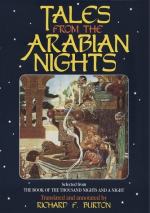Weil has not stated from what sources he drew his work, except that No. 201 is taken from a Ms. in the Ducal Library at Gotha. This is unfortunate, as his version of the great transformation scene in No. 3b (Burton, vol. i., pp. 134, 135), agrees more closely with Galland than with any other original version. In other passages, as when speaking of the punishment of Aziz (No. 9a, aa), Weil seems to have borrowed an expression from Lane, who writes “a cruel wound;” Weil saying “a severe (schwere) wound.”
Whereas Weil gives the only German version known to me of No. 9 (though considerably abridged) he omits many tales contained in Zinserling and Habicht, but whether because his own work was already too bulky, or because his original MSS. did not contain them, I do not know; probably the first supposition is correct, for in any case it was open to him to have translated them from the printed texts, to which he refers in his Preface.
Two important stories (Nos. 200 and 201) are not found in any other version; but as they are translated in my “New Arabian Nights,” I need not discuss them here. I will, however, quote a passage from the story of Judar and Mahmood, which I omitted because it is not required by the context, and because I thought it a little out of place in a book published in a juvenile series. It is interesting from its analogy to the story of Semele.
When King Kashuk (a Jinni) is about to marry the daughter of King Shamkoor, we read (New Arabian Nights, p. 182), “Shamkoor immediately summoned my father, and said, ’Take my daughter, for you have won her heart.’ He immediately provided an outfit for his daughter, and when it was completed, my father and his bride rode away on horseback, while the trousseau of the Princess followed on three hundred camels.” The passage proceeds (the narrator being Daruma, the offspring of the marriage), “When my father had returned home, and was desirous of celebrating his marriage Kandarin (his Wazir) said to him, ’Your wife will be destroyed if you touch her, for you are created of fire, and she is created of earth, which the fire devours. You will then bewail her death when it is too late. To-morrow,’ continued he, ’I will bring you an ointment with which you must rub both her and yourself; and you may then live long and happily together.’ On the following day he brought him a white ointment, and my father anointed himself and his bride with it, and consummated his marriage without danger.”
I may add that this is the only omission of the smallest consequence in my rendering of either story.
I have heard from more than one source that a complete German translation of The Nights was published, and suppressed; but I have not been able to discover the name of the author, the date, or any other particulars relating to the subject.
Von Hammer’s Ms., And the translations derived from it.




